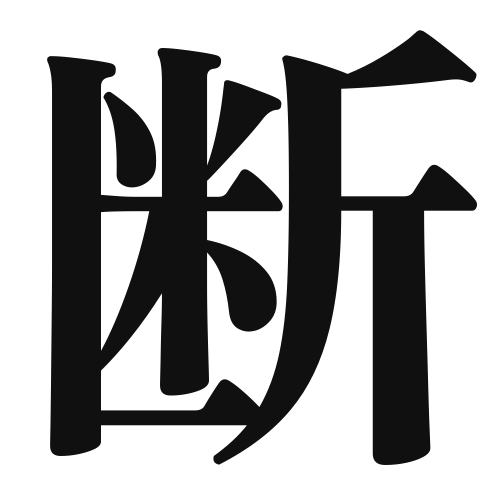1. Overview of Meaning
The kanji “断” (dan) generally means “to cut off,” “to sever,” or “to decide.” It conveys the idea of making a clear distinction or breaking a connection.
2. Formation and Radical
Formation of the Kanji: The kanji “断” is a compound character that combines elements of both meaning and sound. It is classified as a compound ideograph (会意文字), which means it combines different elements to convey a specific meaning.
Radical: The radical for “断” is “刀” (katana), which means “sword” or “knife,” indicating a cutting action.
3. Examples of Usage
Common Words and Phrases: Some frequently used words that include “断” are:
- 断言 (だんげん, dangen) – assertion
- 断絶 (だんぜつ, danzetsu) – severance
- 断念 (だんねん, dannen) – abandonment of a plan
Example Sentences in Daily Conversation:
- 彼はその提案を断った。 (かれはそのていあんをだんった。) – He rejected that proposal.
- 友達との関係を断絶することは難しい。 (ともだちとのかんけいをだんぜつすることはむずかしい。) – It is difficult to sever a relationship with a friend.
4. Synonyms and Antonyms
Similar Kanji: A similar kanji is “切” (きる, kiru), which also means “to cut.” However, “切” is more general and can refer to cutting in various contexts, while “断” emphasizes a decisive or final action.
Antonyms: An antonym of “断” is “続” (ぞく, zoku), which means “to continue” or “to follow,” indicating the opposite of severing or cutting off.
5. Cultural and Historical Background
Relation to Japanese Culture: The concept of “断” is significant in Japanese culture, particularly in the context of making firm decisions or breaking away from negative influences.
Proverbs and Idioms: One common saying is “断固たる決意” (だんこたるけつい, dankotaruketsui), which means “a firm resolution,” highlighting the importance of decisiveness in Japanese society.
